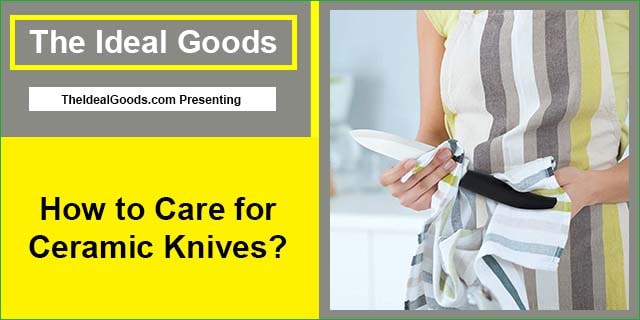Most of the following tips also apply to kitchen knives with steel blades, whether cheap or high quality. The harder a knife is, the more important it is to use it correctly.
Hard knife blades stay sharp longer. Ceramic knives are harder than steel blades. Particularly hard blades can easily be damaged if they are not optimally hard or if they are used incorrectly.
However, proper care and maintenance for ceramic knives or the best ceramic knife sets will keep them in the perfect shape and would make them last for a long time.
Overview of the Best Way to Maintain Ceramic Knife
Rule-1: Always Use a Cutting Board
Rule-2: Do Not Abuse Your Knives
Rule-3: Clean and Wash
Rule-4: Store Properly
Rule-5: Sharpen When It Necessary
Rule-1: Never Use Ceramic Knives Without a Cutting Board
The use of glass, stone boards, or metal boards as a cutting base is also not recommended. Cutting boards should not be too hard, so as not to impair the sharpness of the knife blade. Good cutting boards are wood, bamboo, or plastic.
Rule-2: Do Not Abuse Your Ceramic Knives
Generally, most ceramic blades are half-tang, so their strength is much lower. Ceramic knives are not suitable for activities such as chopping, boning, cutting frozen food, or hard food and cheese, as they could easily break. Knives with a steel blade are recommended for this.
Ceramic blades are even harder than high-quality steel blades and therefore less flexible. Ceramic knives are therefore best suited for straight cuts and must not be used for levering. In general, cutting should only be done straight and from above.
Rule-3: Clean and Wash Ceramic Knives Wisely
Rinse the ceramic knife with detergent and a soft cloth. Then the knives are dried with a soft cloth.
While steel knife blades should be rinsed as soon as possible after use but bacteria do not disturb the ceramic blade; so a later cleaning is therefore possible.
It should be noted, however, that dried-on food residues are more difficult to remove.
Cleaning kitchen knives in the dishwasher is not recommended. This particularly applies to ceramic knives, Damascus steel knives, and all other high-quality kitchen knives.
Spots on the white ceramic knife blade come from coloring food, these can be removed again. If normal washing up cannot remove it, please use ceramic hob detergents or a mild bleach solution.
Rule-4: Store the Ceramic Knives Properly
In order to protect the high-quality blades for a long service life, the ceramic knife can be stored in a protective cover or sheath. When storing in a drawer, the blade must be protected from coming into contact with other knives.
Rule-5: Sharpen Your Ceramic Knife Only When It Necessary
If a ceramic knife is used properly, the blade will remain sharp for what feels like an eternity. Still, the day may come when it will be necessary to sharpen the knife. Here it is important to exercise caution because the particular hardness precludes the use of conventional whetstones.
We recommend professional sharpener or specific sharpening products for ceramic knives, such as diamond sharpener or knife sharpening systems. Sharpening sticks should also be used with caution.
Don’t Miss: Best Self-Sharpening Knife Set Under $100
Final Verdict
It can be used as a normal kitchen knife on a daily basis, just a variety of things have to be considered so that the valuable ceramic knife does not break.
Obviously, if these cautions are being contemplated for the ceramic knife you have more advantages of it than from a steel knife.
